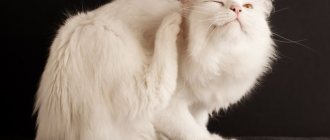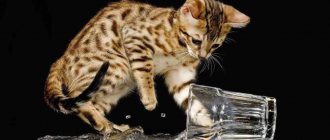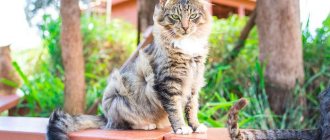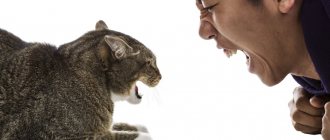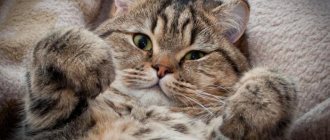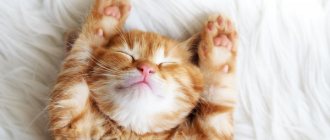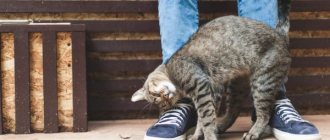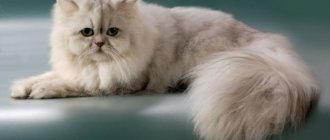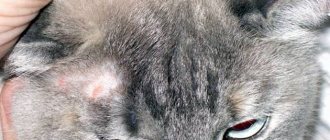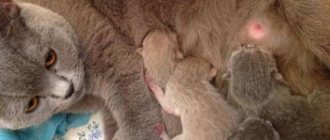There are several explanations why cats love to “butt” and rub their heads against their owner’s legs or arms. In foreign literature, scientists describe in detail this behavior of pets. It can spread not only to the owner, but to other people and even animals. A prerequisite is that the cat must have warm feelings towards them.
Features of physiology
The behavior of four-legged animals is determined by their physiology. Animals have special glands that secrete aromatic substances. They are located in several places:
- on the pads of the feet between the toes;
- in the chin area;
- near the corners of the mouth;
- near the ears;
- in the area of the temples;
- along the entire length of the tail.
The smell of excretions is unique for each animal. With their help, the cat seems to leave its marks on those people and objects that are important to it. In the wild, predators mark their territory this way - then another animal understands that the place is occupied.
Why do cats rub and butt their heads?
The question of why cats butt can be answered not only from an emotional point of view. This behavior has practical implications. When the animal touches objects, it leaves its fur on them. By these marks one can judge the height of the owner of the territory. If it is big, then it is better not to face such a competitor.
For the same reason, cats tend to leave their claw marks as high as possible. You can often see your pet standing on its hind legs in front of the scratching post. Thus he declares his height and physical abilities.
However, leaving fur is not the only way to mark territory. All cats have scent glands on the forehead, behind the ears, on the chin and along the entire length of the tail. This explains the very manner of butting: first with the forehead, then with the ear or cheek, then with the back and tail.
The action of such glands is invisible to the human sense of smell. The fluids are so subtle that our senses do not notice them. However, for animals this is a clear indicator that this territory or object already has its owner.
"Hises like a snake"
Hissing is a very specific sound, eloquently indicating a strong negative reaction. A surge of irritation and negative emotions confirms the entire appearance of the animal:
- open mouth with demonstration of the entire combat set of teeth;
- burning eyes with dilated pupils;
- ears pressed to the head;
- an angry bristling mustache;
- raised wool.
Associated reactions. Depending on the degree of threat and personal temperament, the severity of the defensive reaction is not always the same, so a hissing cat may:
- At the next moment, quickly retreat, fleeing.
- Take a characteristic pose with an arched back and fluffy tail raised up, which means a more serious attitude and an attempt to intimidate the enemy.
- Apply several blows with a clawed paw, while grouping yourself and pressing your stomach to the ground, which symbolizes the intention to fight. The tail twitches nervously or whips from side to side.
Who is guilty. Dissatisfaction, fear and aggression, encrypted in hissing, can be directed both at a specific living object (a rival cat, a dog, a stranger) and “into space”, being initiated by a sudden loud sound or a flashing shadow. Regardless of the source, the cat's expression of displeasure, when further provoked, can develop into an attempt at violent self-defense and end in a harsh aggressive attack.
The language of cats. Why do cats lie on their backs when they see you?
Hello, dear readers of the site Uspei.com. Anyone who loves to hug, does strange things and has a bit of character. My ex? No, I'm talking about cats. Even though cats have been pets since the time of Cleopatra, much is still unknown about them. For example, if they roll over on their back when they see you, what does that mean? Watch on to find out this and much more.
Why do cats lie on their backs when they see you?
When you come home after a long day at work, there is nothing better than seeing your favorite furry pet right in the door. Unless he's hiding. And often he greets us with his stomach up. Lying on their backs and opening their bellies, cats say “Hello” to us.
Kittens do this especially often. They are glad to see you and hope for your attention in the form of treats, affection and, of course, scratching their belly. But a friendly "Hello human" isn't the only message your cat sends you.
By showing off its cute fluffy belly, opening itself up in this way, the cat puts itself in the most vulnerable position. If he lies down next to you on his back, it means that he trusts you completely. He doesn't have to worry about his safety in your presence and feels very comfortable. Wow, what an honor! But although, most often, lying on your back means a friendly greeting and trust.
Cats don't always ask for belly rubs this way, so try not to get into their personal space unless you're sure they like that kind of touch. Also look at both the tail and ears. If the tail moves back and forth and the ears are pressed to the head, it is better to leave the animal alone.
But we are talking about cats, and they do a lot of other things that make us scratch our heads in bewilderment. Therefore, let us explain a few more features in the behavior of cats.
If a cat rubs its head against you
When a cat walks between your legs and rubs his head against them, there is nothing cuter in the world. But why do they do this? This is called butting and it produces pheromones on the animal’s face. Essentially, your pet leaves his scent on you so that other cats know who you belong to. So cute. He considers you one of his own, or he simply makes it clear to you who is whose boss in this house.
If a cat crushes you with its paws
Has it ever happened to you that you are hugging a cat and suddenly he starts kneading you with his little paws? When cats make such movements, you know that they have this left over from the times when they were small. Milk kittens instinctively knead their mother's belly with their paws to help the milk flow better. Well, you need to eat.
But even after switching to adult food, they retain this habit and it means that your cat is happy with you. Your pet also does this to relieve stress, because it is very calming. If your cat often paws at you, it means she feels your protection, as if you were her mother.
If your cat blinks slowly at you
Have you ever had a cat stare into your eyes for a long time, while blinking slowly every few seconds? Yes? It's an awkward situation, I know, but it's actually her way of showing you her affection. By blinking at you without breaking eye contact, they show trust and explain that they feel comfortable.
If the cat is looking at you from afar
Cats are sometimes so distant, they can always be somewhere far away. If your cat likes to wander alone so as not to be disturbed, then this is the norm for her behavior. However, if she seems to be moving away from you more than usual, it's worth keeping an eye on her. If you see your cat looking at you from a distance but not approaching you, she may be worried about something or even angry at you.
Cat behavior specialist Michael Luke says cats tend to retreat if they hear a sudden loud sound or if there's something unusual going on in the house, such as renovations or a party. Unfortunately, there is little you can do here other than give the animal some privacy. Look at him like he's a sullen teenager, leave him alone and don't touch him. Eventually the cat will come to its senses and want attention again.
If the cat is tearing up the furniture
You bought your cat the most expensive scratching post, but your cat is still digging his claws into your new leather sofa. Yeah, try to figure it out here. Experienced animal communicator Karen Miura says the basis for this behavior is the cat's territorial desires. Just like dogs urinate when they are marking territory.
By the way, cats sometimes do this too. Cats scratch furniture to mark their territory. Think of these scratches as boundary markers. If you want to save your unfortunate furniture, Miura recommends spraying it with cat pheromone spray to calm the animal down.
If your cat's teeth are chattering
If your pet's teeth are chattering quickly, he is not cold at all. This is an echo of the natural hunting instinct. This discovery was made as part of a study led by Fabio Roy, from the Wildlife Conservation Society, on the vocal signals of Piebald Tamarins in the Amazon forest.
While studying primates, a wild cat appeared and began to make sounds identical to the voices of Tamarins. From this, Roy concluded that cats, even domestic ones, are capable of copying the voice of prey. Many scientists believe that teeth chattering can express anticipation or frustration. But Roy’s theory is accepted by many specialists.
So the next time you see your cat chattering its teeth, take a look around. Perhaps there is a bird or a mouse somewhere nearby. Well, since we're talking about it.
If a cat brings in dead animals
Agree, cats are very caring. Just think how generous it is to bring you a priceless gift in the form of a freshly killed bird or mouse. Hey, don't get mad at your furry friend. Many experts believe that cats share their prey with you to thank you for your care.
They also hope that you will see their success and begin to pay more attention to them. If you are tired of such bloody gifts, hang a bell around your cat's neck. It is unlikely that she will be able to hunt with such jewelry.
If the cat is sitting in the most unexpected place
If you've ever left an empty box of anything on the floor and you have a cat, it won't be long before he moves into it. Surely you have seen a bunch of jokes on this topic on the Internet and they are true. Cats love to squeeze into tiny spaces, even if they are wildly uncomfortable. This makes them feel safe.
In the wild, cats would appear to be predators when out in the open, so they instinctively seek cover in small spaces. In general, there is no need to spend money on special pillows and beds for cats. A cardboard box or a sink will still win.
If your cat has a burst of energy in the middle of the night
Wow, night has finally come, you are fast asleep when suddenly you hear a loud crash. Your cat has just rushed across the room, destroying everything in its path. What else is this? He just sits and yells, but it’s 2 a.m., after all. This behavior can be very annoying. But there is nothing unusual about it.
Many indoor cats accumulate energy during the day, following their instincts, and at night they simply go crazy. If you're not comfortable with midnight cat runs, try feeding your cat right before bed or giving him a toy with treats to keep him occupied while you fall asleep.
What's the strangest thing your pets do? Don't forget to like and share this post in the comments.
Don't forget to subscribe to the source's YouTube channel!
Expression of affection
If a cat wants to express its affection and love, it begins to intensively rub its head and lightly butt the object of its adoration with its forehead. In addition to the owner, other people who liked the animal in some way can also be awarded this “honor”. It happens that a cat shows his sympathy for other pets, even dogs, in a similar way.
Why do cats love to butt and rub their heads?
Contents hide
Why do cats love to butt and rub their heads?
A behavior model loved by the vast majority of cat lovers. The pet comes up to you, lightly “knocks” and “bumps” its head - as if “butting”. Probably, even a person far from the animal world knows: this is how a cat caresses, expresses its love and gratitude. In English-language specialized literature, the term “allorubbing” was even introduced - a cat can butt and rub not only against the owner or another pleasant person; this behavior extends to the other cat and even the family dog. Of course, if the animals are friendly with each other. We give our word to Ami Shojai - she knows everything about cats!
Why do cats do this? The cat doesn’t just “rub” and “butt” - it also marks the object of interest to it and leaves its unique smell on it. The goals can be different: to express your sympathy and greatest pleasure, and to secure (confirm) ownership.
Scent glands in cats. Cats have several special glands that secrete unique scents. If a cat uses them, other animals will understand that everything is “busy” here. Here is a cat scratching with its claws: thereby it leaves its smell, because one of the locations of such glands is right in the paws between the toes. But in fact, the glands are located not only in the paws! They are also present in the chin area, corners of the mouth, near the temples, ears; starting from the base and along the entire length of the tail. We do not yet know whether all the glands present in a cat secrete the same aroma or not. But when communicating with people they love, cats mostly “use” their heads!
Exactly how the cat will rub depends on the height of the object of interest. Typically, a cat rubs its ears and forehead against high objects, and its chin and neck against lower objects.
Cats rub with each other, regardless of size, with all parts of their bodies. Experts cannot yet come to a consensus on the purpose for which all this is happening. The most likely assumption is that such “caresses” are nothing more than a “redirection of aggression.” In other words, one of the parties assures the other that nothing bad can be expected. A kind of peace sign!
How do cats behave towards people and pets? How can one correctly decipher this behavior of cats? They behave differently: some animals seem ready to smash their heads into shards, others carefully curl around a person’s ankles, touching him with their bodies and tails.
How is your cat behaving? Again, it all depends on the situation. Sometimes a furry pet is in the mood to knock its head against you (tenderly and lovingly), in other situations (and with other people too) it will prefer other options for affection.
Cats tend to mark things and objects that are vital to them. This applies to people too! We advise you to pay attention to exactly how your pet “butts” with you! If he “prefers” your face, and even approaches you with his eyes wide open, then know that he is giving you a huge compliment and expressing the highest degree of trust. After all, he puts himself in a obviously vulnerable position, from his own point of view!
How can we accurately translate cat “butting” and “knocking” into our human language?
Sometimes your cat will simply tell you to “calm down.” Sometimes, as you and I already know, she confesses her love and devotion. But most often the translation turns out to be more prosaic: “You, my friend, are very important to me”! Original post: Cat Bunting Behavior: Deciphering Feline Body Language. Author: Amy Shojai Source and photo:
Hissing as an expression of fear and displeasure
Fear, as you know, is the most important incentive to action.
A sense of security is a cat’s most important need, and the instinct of self-preservation is the basis of survival.
A person can cause fear and fear if the cat:
- Wild and uncommunicative. In this case, the animal does not allow any people to approach itself, does not understand their intentions and does not accept human affection in principle.
- Has negative communication experiences. Unpleasant, scary and painful events from the past can leave an imprint on the current state of the animal. Sometimes a cat demonstrates associative fear and, for example, may hiss at children if it has once encountered their cruelty. Cats also remember a specific offender, expressing persistent negativity towards the person who once insulted “their tailed majesty.” Such a source of unpleasant sensations often becomes a veterinarian who gives injections to a sick animal, measures rectal temperature and performs other very unpleasant actions.
- She is not socialized and has spent her entire life communicating only with a limited circle of people. If an animal is used to living in peace and quiet, communicating only with its owner and his family, then perhaps he will be frightened by a noisy company of guests or a repair team coming to the house.
Pet behavior. Usually a frightened cat tries to run away and hide, but if, after a warning hiss, they block its path to retreat, try to touch it or pick it up, the instinct of active self-defense will kick in. Sometimes a cat hisses at its owner, frightened by a sharp gesture, sound or object in its hands. Aggressive and poorly behaved pets may react with a hiss to the lack of a desired action, for example, when the owner does not give them food or a portion of affection upon request.
Herniated discs
Perhaps this is one of the most unpleasant and serious diseases of the spine that specialists have to deal with in their practice. What is an intervertebral disc? This is a “shock-absorbing cushion” located between the vertebrae. Each disc consists of an outer, rough and fibrous part, as well as a delicate central core, which in consistency is vaguely reminiscent of toothpaste.
Intervertebral discs connect the spine into a single unit and allow it to be flexible. In addition, they also absorb mechanical stress to which the spinal column is constantly exposed. When the outer shell of the disc becomes thinner for some reason, its internal contents begin to protrude into the spinal canal, pinching the spinal cord or, at best, its individual roots. This is an extremely dangerous process, since the cat can remain completely paralyzed at any moment without much chance of correcting the situation.
Why do Scottish Fold and other cats hump? Is this kyphosis?
It is necessary to distinguish pathology from the norm. The first variant of the norm is when a cat arches its back due to fear. All cats have this property: they try to appear bigger and scarier when they encounter danger. This is also called “standing on end.”
The second variant of the norm is that the cat has a slightly rounded back. This is typical for some breeds, for example Scottish cats. But in this case there are no outgrowths on the back: it is only slightly rounder than that of other cats. It looks like this.
If the back is normal, the cat shows no signs of pain when touched, jumps and runs, and leads a normal life.
When do we talk about pathology? When there is pain, when the hump increases in size, when the back no longer looks natural. This is what a cat with a “growth” on its back looks like. Here is an x-ray.
However, you cannot make a diagnosis yourself, because without having the necessary knowledge, it is easy to make a mistake. For example, curvature of the spine in cats is confused with sarcoma. This is a tumor that needs to be removed.
Can cats talk?
Of course they can, every cat owner will confirm this. Depending on the situation, cats purr, coo, purr, scold, express dissatisfaction, growl, and act capriciously. Scientists have found that there are more than 16 sounds, divided into conversation, calls, and cries of excitement. But even more complex are facial expressions and movements. For example, it will seem to a person that the cat suddenly showed aggression, but in fact he simply did not recognize the alarming signals that the cat was “giving.” Get to know your cat's body language so you can understand her.
Licking
The cleanliness of cats is proverbial. Frequent and thorough licking provides almost perfect grooming, but does a cat always lick itself to clean itself? Not at all, sometimes a cat licks its face when there seems to be no need for it. The rapid movement of the tongue around the nose and lips is a clear indication that the cat is excited, surprised or puzzled by something. This short, quick movement of the tongue is akin to the movement of a person scratching the back of his head in a moment of surprise or annoyance. Manifestations of this type are called a reaction to an uncomfortable state; the cat is confused. There is something she doesn’t like and at the same time arouses curiosity; she wants to leave, but curiosity takes over. Staring at the thing that interests her, the cat cannot decide what to do, and here the movements of the tongue are evidence that she is hesitating. Here's another example: You caught a cat in a pot of geraniums and scolded it. And she began, without ceasing, to lick herself, while her ears were pulled back, her eyes were half-closed. This is confusion again. When you are in a good mood, the cat will lick you with love. You will feel it like the touch of a good friend. For example, when my cat Misha says hello, he loves to jump higher, to the level of my face, meows gently and tries to lick me on the forehead and cheek. This is an expression of great affection. The cat licks you, looking for an opportunity to climb onto your lap. Short, jerky licks, while the cat looks into your eyes. This is the search for mercy. The cat licks itself with deep, intense movements. If she is licking herself for obviously longer than necessary, pet her or play with her. This is a manifestation of boredom. If two cats are about to fight and suddenly one of them begins to lick itself, this is a sign on her part of reconciliation.
Communication with your head
If a cat rubs its head against your hands or body, this is a sign of love.
The cat is rubbing against you
The cat approaches you, arching its back, raising its tail (sometimes it moves) and, as it were, runs along your legs, starting from the muzzle, then sideways and at the end turns to you with its raised tail, wrapping it around your legs, and so on several times. Thus, the cat exchanges smells with you, which for it is tantamount to an exchange of information; the cat is friendly, it’s like a friendly handshake and the expectation of affection in return. This movement is learned by cats from infancy, when the mother cat comes to communicate with her babies in the nest. She gently purrs and licks each kitten, starting from the forehead, then the back and ending under the tail, at the same time caressing and washing her babies, because they are still small and cannot clean themselves. Perhaps, after such a greeting ritual, the cat will step aside and begin to lick itself; it will lick your scent off itself, as if “tasting” it.
Communication by tail
The tail flies up: the cat is not scared, not angry, not hungry. He may be excited about your arrival. The tail is lowered: the animal is slightly frightened or, perhaps, a little unhappy with the food you gave it. Perhaps it has stained the bag in which it is carried? Leave the cat alone. The cat has its tail between its legs, the posture is tense: the cat is very unhappy, perhaps it is scared or forced to give up something. Don't touch her. The tail is actively twitching, or the cat is waving it back and forth: back off! Don’t even come close, the cat is unhappy and wants to be alone. If you insist on communication, either aggression will follow on his part, or he will try to run away. Only the tip of the tail twitches: extreme concern, as if the cat hears you gossiping about her, because she can’t stand it! The tail is fluffed, as they say “pipe”: this is anger, the cat is ready to attack! The tip of the tail beating like a whip: a strong threat gesture. Pounding on the floor, wagging tail sharply: negative attitude. Stretched back, with a trembling tip: the excitement of the hunt. Bent to the side and raised: a friendly greeting from the owner.
Communication using paws
The cat lightly hits with a soft paw or pulls on clothes: it means he is asking for something (food, a toy or affection, etc.)
“Kneads” with its paws, slightly releasing its claws: it means it is very satisfied, and usually the cat also purrs and even drools. This interesting feature of behavior is formed in infancy - kittens knead their mother’s belly when they suck milk, so when a cat experiences the most pleasant moments in its life, its childish reflex turns on. If the cat, sitting on your lap, got too carried away and began to release its claws, do not scold him or throw him to the floor, you will greatly offend him, just carefully remove the cat from your lap and do not forget to stroke him affectionately! What happens to an adult cat when it stomps on its owner’s lap can be regarded as a manifestation of childhood on its part. The calm, relaxed pose of the owner seems to say to the cat: “I am your mother, I am waiting and ready to feed you.” An adult cat, sitting on your lap, “falls into childhood,” purring loudly and “kneading” with its paws. From the cat's point of view, this is a moment of the highest love and affection, and the behavior of the owner, angrily driving her away from his lap, is inexplicable for her. No real mother would behave this way, but people behave differently. For a cat, the owners are, of course, parents, because they give her food and take relaxed, enticing poses, but as soon as their “baby” begins to “squeeze out milk,” they suddenly become irritated and drive the “baby” away. This situation is a classic example of misunderstanding between the cat and the owner. And you can avoid it by firmly understanding the fact that the domestic cat is infantile and treats its owners as parents.
Hug with paws: inspiring your love. Paw strikes: a means of defense.
Communicating with the Ears
Ears on the top of the head, directed forward: the cat is in a good mood, ready for play and expressions of love. Ears flat and to the sides: surprise and curiosity. Ears down and back: defensive posture Ears down and back: offensive posture, rage.
Communicating with your eyes
The eyes are wide open and looking straight at you: the cat is all attention, very interested. Eyes half closed: drowsiness and caution. Slit pupils: the cat is alert and confident. Round pupils, “crazy look”: the cat is scared, be careful. The eyes flicker and blink: the cat expresses its devotion. Blurred vision (third eyelid): The cat may be sick, relaxed or offended. A close look, point blank: this is a challenge, keep your distance.
Communicating with your nose
The cat rubs its nose on its face and lips: an expression of love.
Communication using a mustache
The cat rubs its whiskers on its hands or face: great love. Moves his mustache: sniffs. Whiskers drooping: the cat is preoccupied, sick or apathetic.
Various poses
The cat lies calmly, but one of the ears turns sensitively, sometimes the tip of the tail trembles a little: she is relaxed, resting, but something attracted her attention, tearing her out of a blissful slumber, the cat is too lazy to turn around and properly examine the reason, but natural curiosity does not allow her completely ignore this external stimulus; it can be any interesting or unpleasant sound.
The cat crouched to the ground, bowed his head and looked away: an expression of submission, I would even say, of being hunted. Sometimes cats do this thing, in my opinion, for absolutely no apparent reason. I have several cats, they live together and I share my love equally, without forgetting or depriving anyone, but for example, one of the cats, beautiful and well-groomed, every time she shrinks like this when I stretch out my hands to her, as if I Since childhood, she was hit in the kidneys with a mop. An intelligent, harmless animal, she never even raised her voice to her, the biggest shock in her life was being photographed, and yet.
The cat stands sideways, the hair on its back stands on end, its tail is bent in a hook and the fur on it is also bristling: it is trying, as it were, to “become larger” in size, to scare a potential enemy, or at least let it think before attacking such a hulk. It looks very funny when my Rottweiler gets acquainted with older kittens. The dog is very delicate with them, but he is huge and the kitten is instinctively afraid, which is why he tries to appear larger.
It looks very funny when my Rottweiler gets acquainted with older kittens. The dog is very delicate with them, but he is huge and the kitten is instinctively afraid, which is why he tries to appear larger.
Full face: an angry but very brave cat. He will turn to face the enemy, baring his teeth and arching his back. Beware! He can attack.
The cat lies down in front of you and turns over on its back: this is the highest degree of humility and trust. A cat's belly is the most vulnerable place and only people they completely trust can offer to scratch their belly. Be proud, you are very lucky.
The cat is all tucked up, the tail is stretched out, the tip is trembling slightly, the muzzle is stretched forward, the ears are alert and there is a steady, unblinking gaze: a few seconds pass and the cat begins to fidget slightly, sway and suddenly rush forward. He hunts, and the prey can be very different: a mouse, a fly, or slippers.
The cat (female) has fallen with her front paws to the ground, put her butt back and is trampling with her hind paws, and has arched her tail and moved it to the side, while she also makes characteristic sounds, such as purring: your beauty is definitely in heat.
The cat (male) turns its back to a vertical surface with its tail raised and shakes it slightly: in this way it “marks” (you will immediately feel this by the very unpleasant smell), although occasionally cats do such things. This is what sexually mature animals do when they want to “mark” objects with an unfamiliar or unpleasant odor, because other people’s odors can signal danger, so be careful when bringing new furniture into the house; it’s better to immediately stock up on a can of repellent liquid. Then, when the furniture stands in the apartment and is saturated with familiar smells, everything returns to normal.
Hissing when feeling unwell
Pain and physical discomfort are often the cause of irritation in a cat.
The survival instinct dictates that a moping animal should leave everyone, hide in a den and become quiet.
We can conclude that the cat is unhealthy if the hissing is additionally accompanied by:
- refusal of food;
- lethargy and apathy;
- weight loss and tousled hair;
- mucopurulent discharge from the nose and eyes;
- urinary retention and the appearance of blood in the urine;
- drooling, vomiting and stomach upset;
- loss of coordination, unsteadiness of gait and convulsions;
- fever and heavy breathing.
Owner's actions. In cat language, a sick animal asks to be left alone. However, you cannot let the disease take its course and hope for the legendary 9 cat lives. That is why, despite hissing and resistance, the furry pet is urgently transported to a veterinary clinic, where an examination will be carried out and the necessary tests will be done to make a diagnosis and provide qualified assistance.
Examples of how to wean a pet
Dry nose in a cat: main causes and what it means
The cat's increased interest in hygiene procedures begins to irritate over time. To correct the situation, there is no need to scold or punish your pet - he will not understand the reasons for such aggressive behavior and will lose trust in the family.
Important! Weaning from obsessive and bad habits always begins with finding the source of irritation and eliminating it.
Licking your face
Obsessive attention to the face may be associated with:
- with the smell of used cosmetics;
- the aroma of certain products;
- using eau de toilette or mouth freshener.
Before starting the process of weaning a kitten, you need to change decorative and medicinal cosmetics, toothpaste, brush your teeth and wash your hands after eating, and give up perfumes with a strong aroma.
If licking causes a lot of inconvenience, then you can use negative reinforcement tactics. When trying to approach the pet, you need to gently but firmly push it away. After several repetitions, it will dawn on him that the owner does not agree to let him lick his nose.
To distract attention, you can use toys with catnip - they are sold at any pet store. Changing your cat's scratching post and climbing tree also helps combat unnecessary affection.
A new scratching post can distract a cat
Licking hands
Why does my cat constantly lick his hands? The love of cleaning fingers and palms can be provoked by:
- hand creams;
- chlorine-containing detergents;
- the aroma of food - at first the cat will smell them, looking for a source that interests him.
To combat a cat’s obsessive attention, veterinarians recommend:
- put fur gloves on your hands - over time the animal will switch to them, leaving your hands alone;
- lubricate them with lemon juice - the aroma of citrus fruits scares cats;
- stop using certain brands of creams;
- Wash your hands thoroughly after eating and using Belizna.
Why does a cat lick his hand? This may involve begging for food. You should not give in and fulfill the demands of your furry pet - excess weight will cause health problems, and rare requests for treats will develop into regular ones.
Licking feet
The smell, especially after a day of work, is attractive only to pets. There are several other sources of increased attention to the owner’s lower extremities:
- plant-based cream;
- dense vegetation.
First you need to solve the problem of attractive cosmetics and dirty feet. Immediately after returning home, the owner will have to wash them, and the usual cream should be replaced with one that is uninteresting for the pet (with the smell of lemon, etc.).
A girl hugs a cat, relieving stress in the animal.
Playing together with a cat will distract his attention from the coveted limbs and will save the owner for a long time from “bringing gloss and shine.” If an animal is trying to communicate in this way that it is nervous, just take it in your arms, hug it, say something affectionate - it will feel protected and will stop attracting attention to itself.
There are a large number of reasons for strange and unusual behavior in cats. They cannot be fully deciphered - animal psychologists claim that each pet is individual and why it repeats certain actions is impossible to fully understand. However, the owner must analyze the cat's behavior and, if possible, take action.
Harmful cat habits
Why does a cat meow
Some owners of such furry pets complain that the cat pesters them with its screams, which can hardly even be called meows. Moreover, she can do this at the most inappropriate time for such a “heart-to-heart conversation” - for example, at 3.00 in the morning. Moreover, scientists claim that the cat tunes its meowing to a frequency that affects the owner’s subconscious. Why is she doing this? In order to achieve what you want. And, most often in the category of what is desired is... food. By the way, the meowing of cats in its frequency resembles the crying of a small child. And how can at least one person resist such tears? Therefore, it is not surprising that at 3.00 am you are ready to get up, go to the kitchen, open the refrigerator and feed your cat.
Also, meowing, if it is plaintive and prolonged, may indicate that the cat is not feeling well, and in this way the animal wants to attract your attention so that you can help it.
How to stop a cat from meowing
To ensure that the animal does not pester you with its serenades, try to provide it with maximum comfort and attention. As for food, it is better to feed your cat heavily in the evening so as not to give her an early breakfast in the middle of the night. This is the most humane way. We do not consider non-humane options - such as a newspaper, slippers and other objects flying at a meowing cat. Instead, it is better to pick up the cat and pet it. If the animal refuses to eat and still meows pitifully, take a closer look at the cat’s condition. Maybe the animal is sick and really needs your help?
Why does a cat go to the toilet in the wrong place?
Many owners of representatives of the cat family often complain that from time to time their well-mannered pet can suddenly “forget” where to go to the toilet in the house. Why is this happening? Let's see what such an act means in Nature. In this way, animals mark their territory. Accordingly, the cat in your house is trying to show you who is boss in the house - she or you, and to outline her territorial possessions. Convincing her in this situation that she is wrong is pointless, since cats are not people. You can play along with your pet and begin to respect his territorial rights - if the cat wants to sleep in the chair, then let him sleep. With surprise, you will then notice that the animal... has stopped marking its territory.
In the case when the embarrassment occurs on the clothes or shoes of your guests, the cat did this not out of harm, and not because she didn’t like your guest, but because the animal sensed someone else’s smell of the guest, and like a real owner or hostess, other people’s smells it did not tolerate it in its home.
Another explanation for this behavior is a way to get your attention and... punish you. After all, by forcing you to clean up after itself, the cat shows its superiority over you...
Well, the simplest and most banal one is that you forgot to change the litter in the cat litter, and the cat chose to go past it. Here, no one is to blame but you...
How to stop a cat from marking territory
Before you get ready to punish a cat for its offense (it is clear that it is not entirely pleasant), analyze what preceded it. Perhaps the cat's behavior is the animal's reaction? Then, in order to eliminate this phenomenon, you simply need to remove the provoking factor. Then the cat will stop shitting, and you will calm down.
Why can’t we try to solve this problem with force and aggression, as some animal owners do, demonstratively chasing their pet around the apartment and poking its nose into a puddle? A cat's memory is short, and it cannot connect your aggressive behavior with something it did 1 hour ago. As a result, the cat has a new protest, and you think that she spoiled you out of harm.
Only patience, affection, love and care can solve any misunderstanding with a pet - remember this golden rule.
Why does a cat destroy indoor plants?
Some cats do not allow indoor plants to pass through, forcing the owner to make a difficult choice - either them or indoor flowers. In order to preserve both, it is recommended... to plant special grass for cats in a separate pot (which you will naturally place on the windowsill). Greenery will definitely attract the cat’s attention and will be to its taste more than the hard leaves of a palm tree. By the way, such greens will have a beneficial effect on the cat’s health, because if the cat chews it, it will thereby help stimulate the intestines and facilitate the process of regurgitating hairballs that it licks off itself.
Why does a cat scoop up litter from its litter box?
If a cat makes a demonstrative mess near her litter box, she wants to show you that something doesn’t suit her. Perhaps it is necessary to move the toilet to another, more secluded and quiet place, perhaps it is necessary to change the filler... You should not punish the animal, it is better to figure out why it does this.
Why is the cat attacking you?
Cat aggression
It seems to you that after you have played with your cat, you are friends forever, but suddenly your pet suddenly attacks your leg from around the corner? What happened? How did you displease your cat? It is quite possible that you did not offend it in any way, it was just that the animal heard an unusual sound, or simply remembered that the blood of wild animals flows in its veins. Or perhaps this is how the cat attracts attention to itself and invites you to play with it again. There is no point in punishing your pet for this behavior. What can you do, your furry hunter gave you such a surprise.
Why does a cat hiss?
As a rule, in moments of danger, the cat’s behavior changes and it begins to hiss. Ears pressed to the head, and bared fangs and a chilling hiss - all this is a rather threatening picture. Thus, the cat is trying to hide that it is scared and is trying to scare its enemy.
Other reasons
Experts who study domestic cats identify several more reasons for this cat behavior:
- Treatment. Many ancient civilizations considered cats to be sacred animals capable of healing. Some peoples still believe in this. This fact is confirmed by modern research: scientists from the Max Planck Institute for Human Development found that cats come to rub and purr to improve human well-being. This is how the pet tries to relieve pain, relieve stress and fatigue, and cheer up the owner.
- Removing negative energy. Followers of esoteric teachings believe in the psychic abilities of cats. The animal senses the bad energy of Sha, takes it upon itself and transfers it to the ground.
- Filial affection. Some animal psychologists believe that the reason for this behavior is the parent-child relationship between the kitten and the cat. Over time, the kittens begin to treat their owner as a caring mother, and with the ritual of “butting” they inform him of their good health and express gratitude for his care. Street kittens show their goodwill in this way and try to get affection and attention.
- Destroying the marks of other animals. If the owner was visiting, where there were other cats, whom he stroked and picked up, other people’s marks remain on the clothes. The pet is in a hurry to rid its person of foreign odors and marks him with his saliva, actively “butting” him.
Neutral cat habits
Why does a cat rub against your legs?
Do you think that in this way, by rubbing your feet, the cat shows you its affection and love? Well, you're partly right, but that's not all. Thus, the animal declares that you... are its property. The fact is that on the animal’s body, and in particular on the sides, tail and muzzle, there are special glands that secrete pheromones that other representatives of the cat family can “read”. And when a cat rubs against your legs, it marks you with these pheromones, and for other animals this means that this person already has an owner. This is such selfless cat love...
Why does a cat constantly lick itself?
Do you admire the cleanliness of your pet, who licks himself several times a day? However, one should not exaggerate the obsessive cleanliness of cats. In fact, your pet washes every fiber of its coat in order to smell like itself. If you have noticed, he does this especially intensely after you stroke him. You shouldn’t be offended by a cat for this, it’s just that in the animal world it’s very important to smell like yourself. And, that is why, with its rough tongue, the pet performs a mini-massage of the skin, thereby activating the work of special glands that secrete its special smell.
Why does a cat bring mice and birds?
If you live in a private house and the animal has access to the street, then it can often delight you with the corpses of birds or mice, kindly placed under your threshold. Most owners, finding themselves in such a situation, think that in this way the cat shows how it serves them. Not really. Simply, your purring creature takes pity on you (after all, you don’t know how to get your own food) and thus tries to clearly demonstrate to you how to learn to hunt. Well, in this case, all that remains is to praise the cat for her caring attitude towards you. This means she really cares about you.
Why does a cat trample you with its paws or crush soft things?
Experts who study cat behavior call this habit the “milk step.” It is noteworthy that this habit is characteristic of those animals that were taken early from their mother cat. In a state of rest and pleasure, cats, even as adults, fall into childhood and move their front paws, making movements as when feeding with mother's milk. At the same time, the cat may purr like a small tractor and even bite the fabric or your hand.
Is it worth weaning the animal from this habit? In fact, it is quite harmless, therefore, let your pet have the right to such a manifestation of immaturity.
Why does a cat throw things off the table?
Are you trying to discern malicious intent in this cat’s behavior, when she jumps onto the table and throws away objects lying on it? In vain. Thus, the cat is simply inviting you to play with it. As practice shows, in this situation it is better to take a break from your own affairs and pay attention to your pet. Otherwise, the cat will attract him with more radical actions.
Why does a cat bury leftover food?
As a rule, the ritual of fake burying leftover food is performed in situations when: the animal did not like the food, but out of respect for you it still ate a little, the dinner was to its taste, but the cat wants to save it for later, and with its burying it tries to hide it from rivals. After all, in nature, animals very often actually bury leftover food.
Why does a cat sleep on your clothes?
The cat sleeps in your place
It is quite clear that lumps of fur on a just ironed shirt, or a curled up cat on your elegant dress - all this is not at all included in your plans, but do not scold the animal too harshly for such behavior - it’s just that the cat misses you and wants to be closer be to you. How can she achieve this if you are constantly at work? All that's left for the poor guy to do is sleep on your things and inhale your smell. In this case, it is enough to simply allocate a couple of free evenings to your pet, and the cat will forget about this habit.
Why does a cat drink tap water?
The habit of drinking tap water can arise in a cat in two cases: either the owners forgot to pour fresh and clean water for the pet, and the cat is forced to get it for itself, or the animal simply loves water. And, such a “watering hole” is perceived as a game and fun. Of course, because the sound of running water from a tap attracts the animal’s attention and he wonders where the water comes from and where it disappears.
Stroking technique
Experts who study animal behavior have repeatedly conducted experiments on how to pet a cat so that he likes it. As a result, we came to the conclusion that stroking should begin with an attempt to reach out and try to make several strokes on the head or torso. Based on the cat’s reaction, it will be noticeable whether the animal is currently predisposed to affection or not. If the cat moves away from your hand or tries to bite, then you should not anger him and stroke him against his will. If, on the contrary, the animal begins to rub against your hand, expose its head, back or stomach, then the cat is not against caresses.
Superstitions about black cats
The most famous and widespread superstitions and signs are associated with black cats. Moreover, they have both a positive interpretation and negative consequences:
- A black cat crossed the road - there will be trouble.
- For sailors, having a black cat on board is a mandatory attribute, which is a symbol of good luck. The greatest luck for the sailors was that a black cat herself settled on board.
- A black cat in the house protects household members from evil spirits and bad weather.
It is believed that if an animal of this color crosses the road, trouble is expected. But you can ward off failure:
- After such an unpleasant meeting, you need to spit three times over your left shoulder, roll the barrel out of your fingers in your pocket, or grab a button on your clothes.
- There is another way to protect yourself from the consequences of meeting a black cat - you should stop and wait until another person passes the road that the black cat crossed.
Most people are wary of black cats, considering them accomplices of the other world. But any sign and superstition will have no power if a person does not believe in them.
Ears
A cat's ears have many nerve endings. Not surprising, since a cat has a hearing range from 3 to 45 thousand . Hz, while in humans it does not exceed 10 thousand Hz. Cats use their ears to guide them when choosing the direction of movement. In addition, this organ is very gentle and sensitive. Any touch to the ears causes discomfort in the cat.
© shutterstock
Hissing as a breed trait
It has been noted that hissing may be a consequence of the breed's temperament. Thus, emotional, easily excitable cats, characterized by a quick and vivid reaction to what is happening, are prone to outbursts of emotions. These are, for example:
- Siamese;
- egyptian Mau,
- Turkish van;
- Abyssinians;
- Cornish Rex;
- orientals.
Living in isolation and lack of regular physical activity does not benefit the character of these cats, making them even more obnoxious and grouchy.
Features of other breeds. Persian and Siberian cats are very jealous of the cleanliness of their “fur coat” and can become angry if you constantly touch them with your hands. In turn, independent British people do not like hugs and cuddles, so they can hiss when treated with familiarity. And sphinxes are prone to sound outpourings and can hiss from an excess of feelings without any negative connotation.
Hissing as an expression of dissatisfaction and readiness to attack
The ability to see the reasons for a negative reaction and predict further actions underlies the problem-free coexistence of a person and a freedom-loving cat in the same territory. In order not to aggravate the conflict with the hissing cat, it is strongly recommended not to:
- Imposing your company on the cat and pestering it with food or toys . A pet who is in a bad mood has no time for entertainment, and his appetite at such moments noticeably worsens.
- Try to calm the cat by stroking it . At the moment of inflated feelings, a pet may react inappropriately to an outstretched hand, hitting with a clawed paw and leaving a bloody trail.
- Take the cat in your arms and cuddle it . Most likely, such an attempt will immediately fail, and the angry or frightened cat will become even more furious. Some pets may freeze for a moment in the owner’s hands, but then begin to break free with renewed vigor, dodging and using their teeth and claws.
- Block the animal's escape route . The running cat defiantly asks to be left alone. But if the owner is persistent and begins to chase the animal or tries to detain it, he will certainly cause an outbreak of aggression.
- Trying to get the cat out of hiding. A cat's house is an inviolable personal space, so there should be no intrusion from the outside. An animal huddled in a nook is in a state of stress and seeks salvation in an accessible shelter, and if it tries to bother you, it will most likely launch a serious attack.
Cat tenderness
They won't leave you in trouble. Top 6 Dog Breeds for Which Loyalty Is Most Important
Surely every person has seen a cat rubbing its head against its owner’s leg. This is all for a reason: in this way she marks him as her property. There are many receptors on the heads of animals that secrete a kind of secretion that humans cannot feel. But other animals catch this smell well and understand that this owner is already “busy”.
